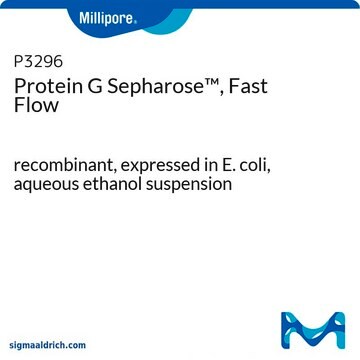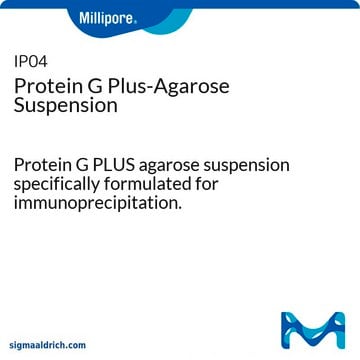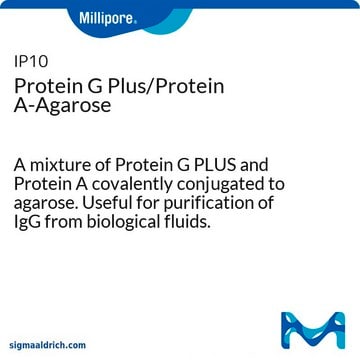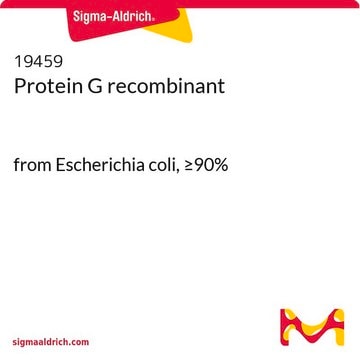PROTGA-RO
Roche
Protein G Agarose
>98% (HPLC and SDS-PAGE), suspension
Synonym(s):
agarose, protein g
Sign Into View Organizational & Contract Pricing
All Photos(1)
About This Item
UNSPSC Code:
41116133
Recommended Products
Assay
>98% (HPLC and SDS-PAGE)
form
suspension
packaging
pkg of 15 mL (05015952001 [settled resin volume])
pkg of 2 mL (11719416001 [settled resin volume])
pkg of 5 mL (11243233001 [settled resin volume])
manufacturer/tradename
Roche
storage temp.
2-8°C
General description
Protein G was initially isolated from G148, a human group G Streptococcal strain. It is a cell wall protein and shows high affinity to IgG (immunoglobulin G). It has a putative molecular weight of 30,000Da. It interacts with all subclasses of human IgG and also binds to mouse, rabbit and goat IgG.
Specificity
Protein G is a cell wall protein, isolated from a specific bacterial strain, which has specific binding sites for certain classes of immunoglobulins from different species. Protein G binds nearly all subclasses of IgG, but no other classes of immunoglobulins.
Binding capacity: 20mg human IgG (polyclonal)/ml (the IgG is loaded at pH 7.0, and eluted with 200mM glycine, pH 2.8)
Structure: recombinant Protein G (E. coli, Mr = 22,000) is covalently coupled to crosslinked 4% agarose beads: 2.5mg Protein G (>98% pure)/1ml gel.
Binding capacity: 20mg human IgG (polyclonal)/ml (the IgG is loaded at pH 7.0, and eluted with 200mM glycine, pH 2.8)
Structure: recombinant Protein G (E. coli, Mr = 22,000) is covalently coupled to crosslinked 4% agarose beads: 2.5mg Protein G (>98% pure)/1ml gel.
Application
Affinity chromatography using Protein G Agarose, like Protein A Agarose, is the method of choice for purification of IgG from many species. It has been used as a pre-clearing agent during-
- Ubiquitination assay
- Immunoprecipitation
Features and Benefits
Contents
Preswollen gel, ready-to-use, 2ml or 5ml gel (settled gel volume) in buffer that contains 14-19% ethanol as a preservative, nonsterile.
Protein G content: 2.5mg/ml preswollen gel
Preswollen gel, ready-to-use, 2ml or 5ml gel (settled gel volume) in buffer that contains 14-19% ethanol as a preservative, nonsterile.
Protein G content: 2.5mg/ml preswollen gel
Quality
Purity: >98% (HPLC, SDS-PAGE); entirely free from staphylococcal enterotoxins.
Other Notes
For life science research only. Not for use in diagnostic procedures.
Signal Word
Warning
Hazard Statements
Precautionary Statements
Hazard Classifications
Eye Irrit. 2 - Flam. Liq. 3
Storage Class Code
3 - Flammable liquids
WGK
WGK 1
Flash Point(F)
102.2 °F
Flash Point(C)
39 °C
Certificates of Analysis (COA)
Search for Certificates of Analysis (COA) by entering the products Lot/Batch Number. Lot and Batch Numbers can be found on a product’s label following the words ‘Lot’ or ‘Batch’.
Already Own This Product?
Find documentation for the products that you have recently purchased in the Document Library.
Customers Also Viewed
Yijiao Ning et al.
Frontiers in oncology, 12, 937716-937716 (2022-10-18)
Aberrant protocadherins (PCDHs) expression trigger tumor invasion and metastasis. PCDH20 anti-tumor functions in various tumor have been identified. Tumor suppression is due to Wnt/β-catenin pathway antagonism and may be suppressed caused by PCDH20 downregulation through promotor methylation, whereas PCDH20 effects
Xiuqing He et al.
Cells, 12(12) (2023-06-28)
The axoneme and accessory structures of flagella are critical for sperm motility and male fertilization. Sperm production needs precise and highly ordered gene expression to initiate and sustain the many cellular processes that result in mature spermatozoa. Here, we identified
Jakob Triebel et al.
European journal of endocrinology, 161(2), 345-353 (2009-05-30)
In vitro experiments and in vivo studies on rodents demonstrate that N-terminal 14, 15, 16, 17, and 18 kDa fragments prolactin-related vasoinhibin (PRL-V) of human PRL are natural inhibitors of neovascularization in the retina and elsewhere. These N-terminal PRL fragments
T-H Kim et al.
Cell death & disease, 5, e1527-e1527 (2014-11-21)
Understanding the molecular networks that regulate adipogenesis is crucial for combating obesity. However, the identity and molecular actions of negative regulators that regulate the early development of adipocytes remain poorly understood. In this study, we investigated the role of CREB3L4
Tessa S van Kempen et al.
European journal of immunology, 50(8), 1209-1219 (2020-03-22)
Ankylosing spondylitis (AS) is associated with autoantibody production to class II MHC-associated invariant chain peptide, CD74/CLIP. In this study, we considered that anti-CD74/CLIP autoantibodies present in sera from AS might recognize CD74 degradation products that accumulate upon deficiency of the
Our team of scientists has experience in all areas of research including Life Science, Material Science, Chemical Synthesis, Chromatography, Analytical and many others.
Contact Technical Service














